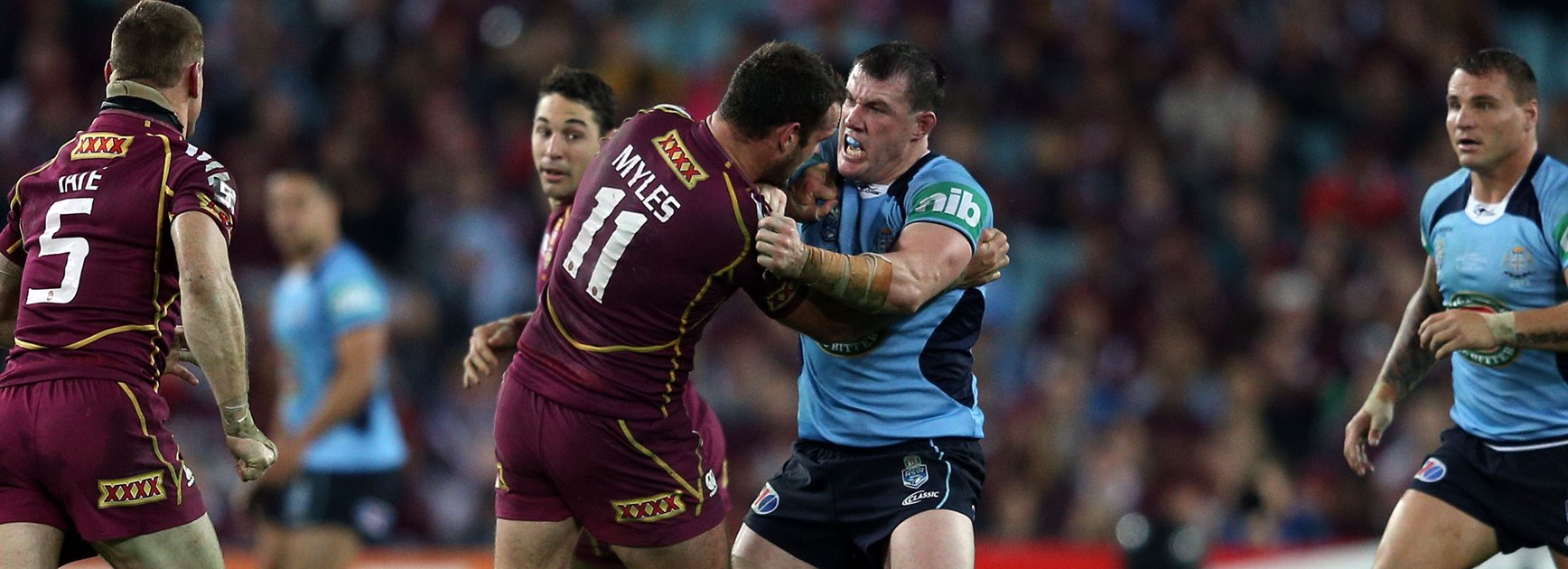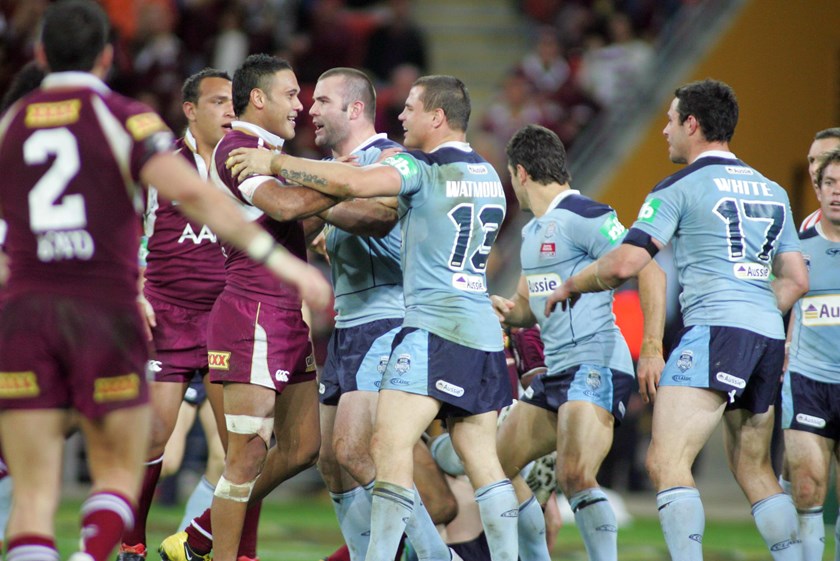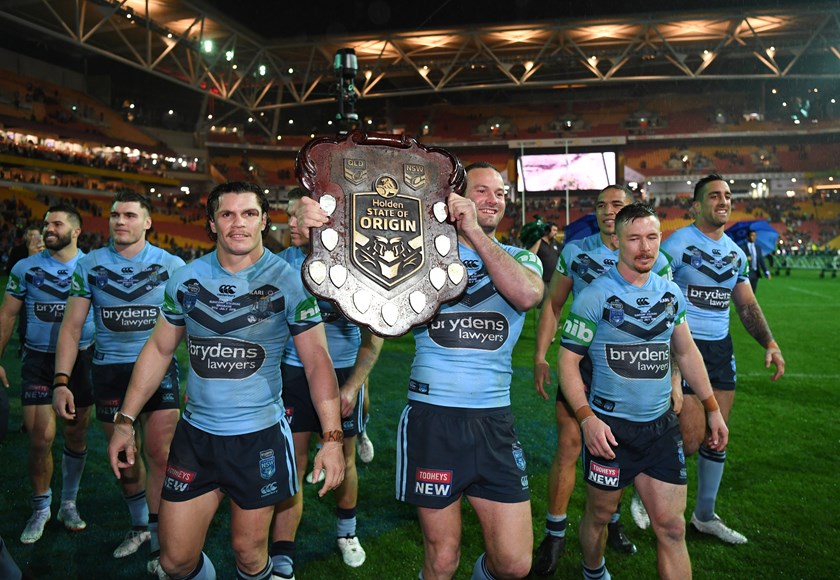
"It's been a torrid, hard, tough encounter and those who said that State of Origin matches would be pansy affairs have got egg all over their faces."
Legendary commentator Rex Mossop delivered a typically blunt - and what was then not considered politically incorrect - verdict during the full-time summary on Channel Seven's broadcast of the inaugural State of Origin match in 1980 at Lang Park.
It is universally agreed the doomsayers who said Origin would never work have been proven wrong on an annual basis for 40 years as the concept has gone from strength to strength, with record ratings and sell-out crowds now expected each series.
This year's series, beginning in Brisbane on Wednesday night, is being tipped to generate more than $100 million in revenue for the game.
Origin will move to Perth on June 23 after the opening clash at Suncorp Stadium, while a game will be played in Adelaide next year before the concept returns to Melbourne in 2021.
The NRL has also received interest from New Zealand, Singapore and the United States about hosting future matches.
As the game celebrates the 40th anniversary of State of Origin, it is clear the 2013 punching ban that ended the type of on-field violence that Mossop and many others attributed for the concept's immediate success has not affected the public's interest.

Nor has Queensland's era of domination, with the 2006 series decider which began the Maroons' eight-year hold on the State of Origin Shield being the first match to attract more than 2 million capital city viewers.
Since then, Origin has regularly drawn television audiences of more than 10 million for each series, with 12.2 million viewers tuning in for the 2013 series and the decider being the most watched game in Origin history after 4.194 million people tuned in around Australia.
Origins of Origin
It's well documented how Arthur Beetson ensured the success of State of Origin when he captained Queensland in his first appearance for the Maroons after playing 17 matches for NSW before the concept came to fruition in 1980.
QRL chairman and Queensland senator Ron McAullife and his NSWRL counterpart Kevin Humphreys were the driving forces behind Origin in a bid to revive interest in the interstate series after decades of domination by the Blues.
Bolstered by Queenslanders playing in the Sydney-based NSWRL competition, the Blues had won every series since 1960 and had only lost three times in the previous 40 years.
A crowd of just 1368 had attended the previous match at Leicharddt Oval, won 17-7 by NSW, and with the Blues winning the opening two games of the 1980 series McAuliffe and Humphreys agreed Origin-based teams would contest the dead rubber.
The QRL had previously established a "ways and means committee" to try to keep the state's best players in Queensland and a $150,000 "protection and procurement" fund was created to pay them but the dam wall burst when 14 players joined Sydney clubs in 1978.
According to renowned journalist Hugh Lunn, who coined the phrase, "there is no such thing as an ex-Queenslander", while discussing the Origin concept with McAuliffe, the game was the first time in Australian sport that the winning players received a share of the gate.
State Of Origin: Rivalry Without Rival
"With other sponsorship plus a match fee of $200 the winning team would get up to $1400 a man," Lunn wrote in The Night We Beat The Blues.
Among the seven Sydney-based Queensland players who pulled on the jersey of their home state was Roosters hooker John Lang, who later coached Penrith to the 2003 premiership and had stints in charge of Cronulla and South Sydney.
"I had played for NSW earlier in the year and that was a strange experience, I can tell you," Lang said. "It seems hard to imagine these days but I don't think anyone realised how big it was going to be.
"During the 1990s the crowds weren't as big as they are now so it has taken a long time to build to what it has become.
"For years Queenslanders had said 'if we had our own players we'd be able to win' and when that happened it was probably pretty important. If NSW had won, I think it would have taken a lot longer for Origin to take hold."
NSW hooker Steve Edge said he knew Origin would be a success because the Maroons team was full of players who'd come to Sydney to test themselves in the best competition in the world.
"If you were any good you came to Sydney. Brian Lockwood, Mike Stephenson and all those guys came out from England to play in Sydney and so did the best Queenslanders," Edge said.
"Secondly, if you are playing against your mates there is no way you are going to let them get over the top of you because they will talk about it for the rest of their lives, which they still do, so that is why I knew it was going to be fair dinkum."
Mate v mate
The legend of Origin has it that Beetson landed a punch on the chin of his Parramatta teammate Mick Cronin, which demonstrated what the concept meant to the players, particularly those from Queensland.
However, the opening chapter of Neil Cadigan's 2011 book Greats of Origin debunks that "myth" and he says Beetson showed how seriously he was taking the match when he collected Gary Hambly around the throat in just the second tackle.
A wild brawl erupted later in the game after Graeme Wynn elbowed Greg Oliphant in the throat after taking exception to a punch from the Maroons halfback in a tackle.
Origin is never going to fade, not in the foreseeable future.
John Lang
"Beetson, always the leader that night, was the first player in to defend the smaller man in the debate," Cadigan wrote. "As he held Wynn's jersey with one hand, he hit him with vicious uppercuts with the other. Three separate scuffles broke out."
Edge said he was the Eels teammate who Beetson had gone after in an act which proved club loyalties meant nothing in Origin.
"It is true and it's in his book, people always talk about him belting Mick Cronin but he said 'Edgy was the first one I hit'," Edge said. "Fortunately, I knew it was coming and I avoided it. I pushed someone else in front of me.
"The media were totally down on Origin, they said it wasn't going to work. They said Beetson would look after Edgy, Edgy would look after Beetson and all that type of thing but once you pull on a Blues jersey and they pull on a Maroons one you aren't going to let your state down.
"It was quite a rough game but it was probably the first time the speed of the game was a factor. It was probably the quickest game I ever played in and I think because of the quality of the football on the night and the physicality of the whole thing it has just grown."
Punching ban
Former NRL CEO Dave Smith outlawed punching after NSW captain Paul Gallen escaped with a penalty for his one-two combination on Maroons forward Nate Myles in the opening match of the 2013 series.
Four players were sin-binned after a brawl in the following match and there has hardly been a punch thrown in Origin since.
"I think it has evolved away from the spite and hatefulness into a great sporting contest," Lang said. "I think the fact State of Origin isn't all about the biff and that now there is more interest from the general community.
"Origin is never going to fade, not in the foreseeable future. It's like cricket, even when Australia and England aren't the top nations the Ashes series is always a big one. Whatever happens with the international game I don't think it will affect State of Origin. It has become a national event."
Ratings and crowds
Last year's series was watched by crowds totalling 220,559 – the second-most attended series after 2015, which drew 224,145 fans to the three games in Sydney, Brisbane and Melbourne.
Before the opening of the Olympic Stadium for 2000 Games in Sydney and the upgrade of Lang Park in 2003, Origin crowds usually totalled about 100,000 for a series.
The lowest attendances were 16,559 at Lang Park for the third game of the 1984 series and 16,910 for the 1988 dead-rubber at the Sydney Football Stadium.

According to mediaweek.com.au, television audiences have also been growing almost every year since 2003 when 9.049 million viewers tuned in to see Phil Gould's NSW team win the first of three consecutive series.
The 2008 series was the first to exceed 10 million viewers and Origin did so every year between 2011 and 2017, peaking at 12.2 million viewers in 2013. The 2012 series attracted audiences of 11.873 million and the 2014 series was watched by 11.563 million viewers.
However, the success of Brad Fittler's NSW team at ANZ Stadium and the MCG resulted in last year's dead rubber at Lang Park attracting a television audience of less than three million for the first time since the third game of the 2010 series.
The future
With the NRL guaranteeing Sydney and Brisbane will host one Origin each per series, other cities are now bidding to host the remaining match and a game will be played away from Australia's Eastern Seaboard for just second time when the teams play at Optus Stadium on June 23.
The previous occasion was the 1987 exhibition match at Long Beach, California, which drew a crowd of 12,432.
The 60,000 sell-out in Perth will be played on the standalone representative weekend, which was introduced last year, with one game each series to be held on a Sunday night.
It is unlikely further standalone rounds will be considered before the next broadcast deal in 2023 but the NRL's long-term thinking may include taking an Origin overseas, with Singapore Sports Hub and Eden Park possible venues.
There has also been North American interest in Origin but the NRL is not actively pursuing overseas options at this stage given the demand from major Australian cities.
The 2020 Origin match at Adelaide Oval is predicted to deliver more than $15 million to the local economy, while the Victorian Government has secured further games in 2021 and 2025.
Be part of the action for Origin I at Suncorp Stadium Secure your seats here


